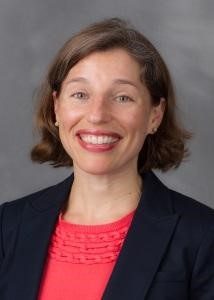An estimated 1.9 million Americans received new cancer diagnoses in 2022, and 609,360 died of cancer, according to the American Cancer Society. These staggering statistics underscore the reality that cancer patients and survivors across the U.S. need compassionate therapeutic relationships and social support systems as they navigate treatment.

Dr. Allison Forti, a licensed clinical mental health counselor and associate teaching professor in the Department of Counseling at Wake Forest University, has dedicated her career to working with cancer survivors and their loved ones. Her work involves teaching the next generation of counselors how to support individuals and families living with severe chronic illness.

In her work as an expert in self-compassion, resilience and holistic wellness, Forti has learned a great deal from her clients and their loved ones. Individuals interested in counseling those with cancer can get an inside view into this work as Forti shares her approach to therapy, mentorship and teaching in the counseling profession.
Learning to Listen
As Forti explains, her route to working with cancer survivors and other vulnerable populations was serendipitous. She originally intended to work with couples, but things changed when Forti secured an internship at a cancer center.
“The moment I walked into the hospital on my first day and shadowed a remarkably talented psychologist as he rounded from patient to patient, I witnessed the impact of a compassionate therapeutic relationship, the delicate line between life and death, and the humanistic need for companionship in suffering,” Forti says.
Forti can still recall advice her supervisor gave her. “‘Listen carefully and respond thoughtfully.’ His simple words carry significant meaning to me,” she says. “I knew at that moment I wanted to listen to people experiencing cancer, and I wanted to help.”
Forti has gained wisdom and an affirming perspective on life from her work with people experiencing cancer. “Cancer patients know that life can instantly change and tomorrow is not guaranteed,” she says. “Their suffering reminds us to be mindful of moments, embody and live by our values, appreciate ordinary wonders, and to be kind to others at all times, as you never know what someone is going through in life.”
Self-Compassion and Motivation
When asked about common misunderstandings about her work as a counselor, Forti explains that many people have an incomplete picture of self-compassion.
“Self-compassion is an important concept for cancer survivors and their loved ones,” Forti says. “In my years of group work with cancer survivors, I often heard stories of regret, guilt and shame about how their illness and treatment impacted the family through a disruption to regular life, financial burden or simply not being able to care for themselves or their family the way they wanted.”
Forti explains that self-compassion is often overlooked as a source of strength and resilience, whether for individuals battling cancer or anyone facing a life challenge. “I wish people would avoid equating self-compassion with weakness and failure,” she says.
Survivors and Students Benefit from Self-Compassion
Forti notes that students in particular often mistakenly treat self-compassion as a hindrance to academic and professional success. “Students often reply, ‘I have to be hard on myself to be successful. I have to be tough on myself when I set high expectations and goals,’” she says. “Many of us have learned that negative self-talk and fear are powerful motivators towards a personal goal.”
But Forti believes there are healthier ways to motivate ourselves. “Self-compassion,” she says, “offers a chance to obtain personal goals with less suffering and more internal support.”
Forti continues: “Some goals in life inherently come with challenge and disappointment, yet the narrative surrounding those challenges can be self-critical or self-supportive. One route contributes to anxiety, depression, relational disconnection and immobilization, while the other leads to self-soothing, emotional regulation and space to recover from setbacks quickly. In some ways, utilizing self-compassion requires strength and mental toughness because it is counterculture to what many people have been taught throughout life.”
Resilience and Adaptation
In her experience working with cancer survivors and their loved ones, Forti has also learned to question common assumptions about resilience. In particular, she thinks more people should understand that resilience involves enduring pain and hardship and adapting to it — not avoiding difficulties altogether.
“Cancer survivors have no choice but to be resilient. However, the process toward resilience can be painful,” Forti says. “The examples of working with cancer survivors that stick with me are of human adaptation to circumstances that seem, at face value, unadaptable.”
All survivors have unique stories of resilience. “I can think of one exquisite human being who made his living in a profession that required him to be on his feet and physical,” Forti recalls about one of her more memorable experiences with a patient, editing identifiable details to protect his privacy. “When cancer caused permanent paralysis at the waist and below, he had to learn how to adapt while facing multiple near-death experiences throughout treatment. I remember how his spirits would rise after recovering from yet another near-death experience and then rise again and again and again.”
Reframing Death as a Teacher
Working with cancer survivors has given Forti a new perspective on life—and death. “I learned that death is a teacher if we are open to being the student,” she explains. “When we lean into the impermanence of life, it frees us to live with an unharnessed spirit of love, compassion and authenticity.”
Forti remembers another cancer survivor who, after being told she had one year to live, came up with a creative way to adapt to her new circumstances. “As the medicine keeping her alive sickened her body into a perpetual state of flu-like symptoms,” Forti says, “she no longer had the energy to engage in her favorite activity, whitewater kayaking. Maintaining her zest for life and playful spirit, she adapted by taking beautiful photos of her friends kayaking in the waters.”
Forti says, “I learned that adaptability, a sense of community and the ability to find humor in dark tunnels creates one more day to be grateful, to be breathing, to be full and alive.”
Among her many professional accomplishments, Forti is proudest of the “hidden moments of compassion and empathy” with the individuals and groups she seeks to help.
“It might sound dark, but I have always been drawn toward helping others in distress,” she says. “Being a helper feels authentic for me. All of these moments do not create a new line on my curriculum vitae or count towards my promotion dossier, but they count to me and the people I help.”
Counseling and Healing
Forti explains that while counseling can lead to healing, the healing journey for processing grief and coping with tragedy does not take a preset path.
“Some people think counseling fixes everything,” Forti says. “Counseling is not a magical solution for the sadness, anger, or grief and loss accumulated through lived experiences. It is a professional relationship that utilizes compassion and empathy to explore concerns and find new ways of thinking, behaving or feeling.”
Forti recognizes that clients can get stuck in conditional modes of thinking about counseling, offering these examples: “If my partner and I go to couples counseling, we will stay together. If I go to counseling, I will be happier about my lost hopes of having a baby. If I get the right counselor, I will finally be able to recover from addiction.” In Forti’s experience, this mindset — in which counseling is a cure-all for the challenges and negative emotions clients are feeling — often ends in disappointment.
“What people think healing looks like and what healing actually looks like do not always align,” she says.
Forti advises that clients approach counseling as a place to work through difficult emotions with a compassionate therapist who can offer support — without the guarantee of a preset outcome. “Counseling takes work and can sometimes be uncomfortable,” she says. “Processing grief and loss, examining yourself from a new perspective, acknowledging past or current trauma feels bad. Counseling offers a process for someone to accompany you on a healing journey.”
Teaching and Mentoring the Next Generation of Counselors
Forti has developed her own approach to teaching and mentoring the next generation of counselors. When working with students, she emphasizes the connection between counselors and their clients as a foundational element that often dictates the effectiveness of treatment.
“(Renowned psychologist) Carl Rogers suggested three necessary factors must be present in order to create a strong therapeutic relationship with a client: unconditional positive regard, empathy and genuineness,” Forti says. “I emphasize these important concepts in my teaching because the relationship between counselor and client is the essential ingredient to creating change.”
Forti continues, “In other words, clients get what they need from therapy through their relationship with the counselor.”
Forti considers the ethical and professional development of her students to be a top priority. Her teaching centers on helping her students cultivate the virtues of an effective counselor. “Counseling students need to learn a different way of being with people who think differently than they do or hold conflicting values so they can listen in a therapeutic way,” Forti says, hearkening back to the importance of listening that she learned from her own supervisor years ago. “Therefore, I emphasize the importance of humility and compassion in order to help students hold all clients with a sense of nonjudgmental positive regard … These virtues are necessary precursors to attentive listening.”
Answer the Call to Support Survivors
Are you interested in becoming a counselor? Study with compassionate counseling experts like Dr. Allison Forti, associate teaching professor in the Department of Counseling at Wake Forest University.
Forti explains that at Wake Forest, “faculty are committed to supporting students in their counselor development and will shine a light on every student in their class to help them reach their potential.”
Explore the online Master of Arts in Counseling program at Wake Forest University and discover how it can help you pursue your professional goals.
Recommended Reading:
Serving Humanity: Career Opportunities in Mental Health
What Is Human Growth and Development?
Sources:
American Cancer Society, Cancer Facts and Figures 2022
Psychology Today, “How to Cope with Hair Loss Due to Chemotherapy”
Psychology Today, “The Intersection of Orthorexia and Cancer”
Wake Forest University, Online Counseling, Dr. Allison Forti
